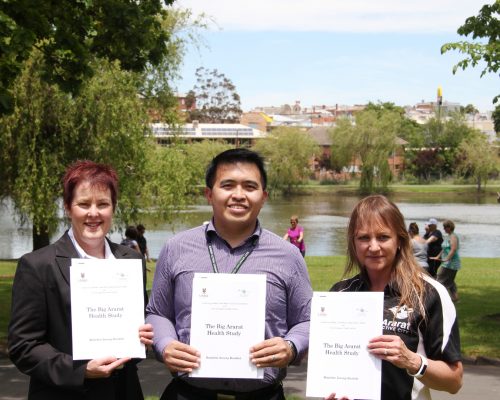Ararat’s Health Under the Microscope
The health of Ararat’s over 35s is about to be put under the microscope with the launch of The Big Ararat Health Study.
The Big Ararat Health Study is a research collaborative partnership between the University of New South Wales Rural Clinical School and East Grampians Health Service.
The study aims to develop a comprehensive population-based research data base and biobank that will assist the local community in understanding associations between general health and chronic disease in Ararat Rural City and the wider Grampians Pyrenees region.
The study will see 3500 surveys distributed, representing 50 per cent of the Ararat population of those 35 years and over.
“The Big Ararat Health Study was designed by our UNSW Rural Clinical School in partnership with many stakeholders in the local area of Ararat,” UNSW Associate Professor Craig McLachlan said.
“This exciting study represents one of our flagship projects in terms of its scope and the study’s ability to provide a beneficial impact on rural health outcomes for the Ararat community.
“We are very excited to start this project, with our PhD student Dr Alex Gavino recently relocating to Ararat.”
Stage one of the study is a comprehensive baseline survey, which is aimed at people 35 years or older living in the Ararat Rural City and wider region.
It is believed to be one of the largest health surveys conducted in rural Australia with respect to the detailed number of health and health-related consumer questions asked.
This baseline survey will allow the researchers to learn about the health conditions, lifestyle, wellbeing, behaviour and attitudes of participants.
The baseline survey also includes questions relating to The Biggest Loser, the Pebble Program and Active8 and whether these programs have had an impact on the lives of over 35s.
A follow-up questionnaire will be sent to participants in two-and-a-half years to update the information about health and lifestyle.
The second part of the study, if participants wish to continue, is to undertake a series of baseline health assessments. These will include measurement of height, weight, waist circumference, blood pressure, electrocardiogram (ECG), autonomic nerve function, lung function, memory and cognition and blood extraction for routine and biomarker tests.
Taking part in these health assessments is entirely voluntary, and participants are free to withdraw at any time from the study.
A separate consent form will be provided at each stage of the study.
All information gathered will be confidential and participants’ privacy will be maintained at all times. Only the local research personnel and UNSW researchers will have access to identifiable data and the study has undergone a strict ethical approval process.
Researcher Dr Alex Gavino, who is working out of East Grampians Health Service, said the data obtained from the study will be used to determine how the health of the population can be improved and whether intervention has been effective.
“A crucial part of the survey will be to determine whether completing the survey also makes you start to think about your own health and lifestyle,” Dr Gavino said.
“Our aim is to get a comprehensive understanding of the health of the locality.”
For those who participate in the health assessments, Dr Gavino will prepare a report which participants can then take to their GP if they wish.
“We have developed this project as a long term health tracking project in the greater city of Ararat, the study is not dissimilar to the famous Framingham study in the USA where they track health outcomes over time with a focus on cardiovascular disease,” Associate Professor McLachlan said.
“Our focus is on both cardiovascular and metabolic disease. Metabolic disease includes obesity, diabetes and will review metabolic disease with respect to its impact on wellbeing and other diseases, such as cancer, respiratory, cardiovascular and memory problems.
“We are also excited that we have designed our study to focus on social aspects of health and how a connected community may influence each other’s health.
“This study will allow testing and access to new and emerging technologies that will benefit the health of many, a particular focus of this study is the alignment with emerging health technology industry products in partnership with UNSW and also the local health services.”
East Grampians Health Service CEO Nick Bush urged community members in the over 35 year age group to consider being part of The Big Ararat Health Study, which will eventually provide a valuable snapshot of the health of the community in that age group.
“Often as people reach the age of 35-40 they begin to consider their health,” Mr Bush said.
“We want to be able to gauge the health of the community through the data collected in the survey, but also perhaps galvanise the over-35s to start looking at their lifestyle and hopefully, with just a few small tweaks, improve their health so that as they age they won’t be subject to conditions such as heart disease and diabetes.
“This is the ultimate benefit of participation in the study and a flow on effect of the already great health outcomes we have seen since The Biggest Loser first came to town.”
Surveys will be available from Ararat Rural City municipal offices, Ararat Regional Library, Ararat Fitness Centre, East Grampians Health Service reception and EGHS Community Health Centre.

Pictured above: East Grampians Health Service director of community services Debbie Schulz, University of New South Wales PhD candidate Dr Alex Gavino and Ararat Rural City manager community development and client services Angela Hunt with The Big Ararat Health Study survey
 (03) 5352 9300IN AN EMERGENCY CALL 000
(03) 5352 9300IN AN EMERGENCY CALL 000



